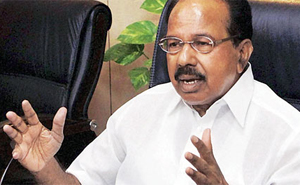
New Delhi, Jun 12: India is in talks with overseas explorers to buy as much as 20 million tonnes of liquefied natural gas (LNG), Petroleum Minister Veerappa Moily said on Tuesday, but expressed concern over increasing landing cost of LNG.
“India has now become the fifth largest importer of LNG after Japan, South Korea, the UK and Spain and accounts for 5.5 per cent of the total trade,” he said, addressing the third IEF NOC-IOC Forum.
A lot of capacities are being created in India and a huge number of supply deals have been there. The LNG regasification capacity is expected to be more than 50 million tonnes per annum by 2016-17 with a supply of 198 million standard cubic meters per day, he said.
India already has secured a supply deal of around 14 mmtpa and around 20 mmtpa deals are in the pipeline. “But the challenge before us is that the landed cost is expected to remain high, the lower range of which may be $10-12/mmbtu,” he said.
“Making LNG a cheaper comparable fuel option is a great task,” the minister said.
India has three operational LNG import facilities — 10 million tonnes terminal at Dahej and 3.6 million tonnes plant at Hazira in Gujarat and 5 million tonnes terminal at Dabhol in Maharashtra.
A 5 million tonnes capacity terminal is to be commissioned in Kochi, Kerala this year. LNG terminals are being planned on the east coast as well.
Moily, however, underlined the need for reducing the energy import cost by 50 per cent by 2020, 75 per cent by 2025 and eventually achieve self-sufficiency and energy independence by 2030.
“Part of this will be done by finding more oil and gas. Despite very low per capita consumption of energy, which is about one-third of the global average, India is the fourth- largest consumer of energy in the world and is expected to become the third largest consumer of energy by 2030,” he said.
India’s energy consumption will grow at around 7.2 per cent during 2007-2030 in comparison to the world average of 1.5 per cent, he said. As per IEA projections, India will be needing an additional 271 million tonnes of oil and 97 million tonnes of oil equivalent gas per annum by 2030.





Comments
Add new comment